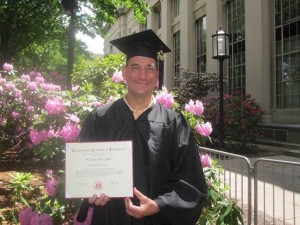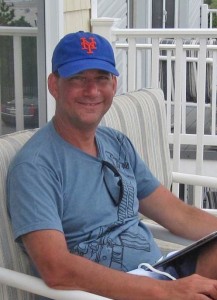Waiting 37 Years for an MIT Degree
-
-
slice.mit.edu
- 3
Filed Under
Recommended
Yet unlike most grads that day, Zelin will have a surprising suffix added to his MIT affiliation. While most undergraduates will add ’14 to their names, Zelin will add ’81.
 Updated photo:
Updated photo:
That’s because Zelin, who completed all four undergrad years at MIT more than three decades ago, never walked in Commencement nor received a diploma. His program at the time, Course 6A, required students to complete their master’s thesis before earning both undergraduate and graduate degrees. Because he stopped short of completing his thesis, he never received either degree. When he double-checked the requirements a few years later, they were still rigid on that point, and he let the issue lie for a quarter century.
“I had a job after graduation,” Zelin recalls, “and my thesis became bigger than originally planned. My new employer was willing to wait a few months, but ultimately I had to start the job with an intent to finish the thesis at night. The reality of getting wrapped up in my first job got in the way of that plan."
“There was a lot of disappointment at home,” Zelin adds, “particularly when my advisor, Professor Leonard Gould, pulled my parents aside at a dinner we had before I left and prophetically proclaimed to them that I would likely not finish the thesis. They trusted me more than him–oops!"
Zelin moved to New Jersey and took a job with Datascope in the medical devices field. Later, he became CTO of a startup called i-STAT, which since became a $400-million dollar business unit of Abbott Labs. There, Zelin is now VP of R&D for the business. Zelin holds nearly twenty patents in fields such as pulse oximetry and blood pressure monitoring from his days at Datascope and miniaturized point of care blood diagnostics from his work at i-STAT.
Through his stellar career, Zelin has always been honest with his colleagues about never having graduated from college. “It’s been fodder for jokes in the office,” he says, “though a lot of people point out that it’s kind of cool nowadays not to have a degree in the startup world.”
When a medical visit brought him to Boston this winter, Zelin figured he would stop in again at the registrar’s office on campus. It turns out that the old Course 6A requirement changed back in 1995, years after his last check-in. “Now they decided that simply submitting a thesis proposal would meet the requirements of the undergrad degree, so I had no more work to do!” says Zelin. He completed his paperwork for commencement and began making plans.
“When we see people like [Zelin] we say, ‘let’s work with you,’” says EECS undergraduate advisor Anne Hunter, who speculates that there are hundreds of potential MIT alumni who, like Zelin, are eligible to come back and apply for a diploma. Hunter notes that it’s impossible to query all student records, so alumni—all undergraduates who completed one semester are official MIT alumni—who didn’t quite graduate should get in touch.
Zelin plans to become more involved in the MIT Alumni Association in the years ahead, offering advice to undergrads or mentoring fellow alumni. He will also look forward to telling his Zeta Beta Tau frat brothers of his new accomplishment, not to mention attending his 35th reunion in 2017.









Comments
Dan Lufkin
Tue, 07/29/2014 4:02pm
This strikes me as reverse Schadenfreude, a useful German term for taking pleasure in the misfortune of another. It's not in my German dictionary, but I think that Erfolgneid, envy at the success of another, fills the bill. Anyway, Norman Mailer is supposed to have said, "Success is only half as sweet when no one envies you."
raising questi…
Tue, 07/29/2014 12:17pm
The article said the rule of the requirement has changed decades later. But, I don't think the leniency shouldn't have been offered. On what ground? Explain how that is even right in the eyes of others in the same situation.
Would the Academy Awards Committee give away trophies to the former nominees years later as their standard changes later? Would the cyclist, Armstrong, get his medals and race records back, if Steroid and other banned medical substances are allowed decades later? At least the films were complete, and Armstrong finished his races.
Back in the days, he had "chosen" not to finish his thesis and not to be qualified to graduate. It was "INCOMPLETE" by his choice and he was not qualified to graduate. It was not like a hardship to continue to study. It was a matter of choice between A & B. Furthermore, couldn't he have submitted another thesis, based on the field experience? At least, that could have been a fair second chance. Or, how about the honorary degree, instead, with some attachment of big contribution or expertise to his department at MIT?
Thanks for the sending the very questionable, uninspiring story in the academic field of MIT today.
I ponder his decades of life experience is to come again to cheat, this time with his successful job title to impress some of the school panel. At least, the story doesn't read right. And, again, MIT delivered a strange decision.
Beverly & …
Fri, 07/25/2014 12:39pm
Michael: Congratulations. We don't know anyone else who needed anything close
to 37 years to finish college. You must have been a very, very slow learner.
We are looking forward to personally congratulating you next month.
Our best wishes to you and family. Bev & Hap